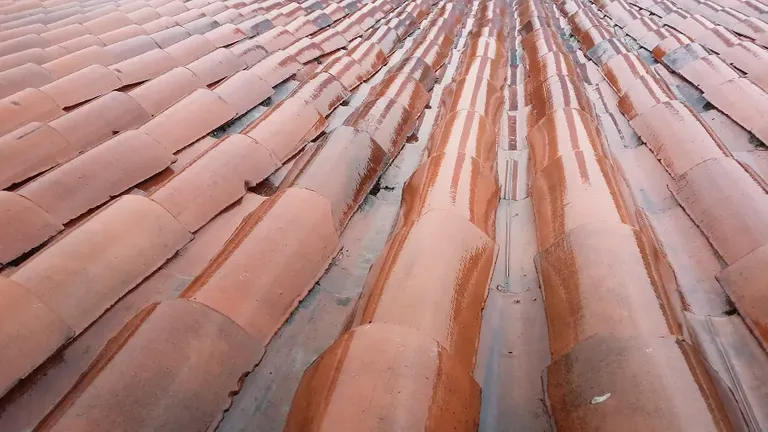Materials used in roof covers.

Hello friends, welcome to my blog; In this publication I will touch again on the topic of roofing, this time roofing, here there are three most important materials to take into account when making this roof, such as the waterproofing, the gutters and the tile.

If sometimes it rains very hard, but the temperature is constant throughout the year, therefore, it is very rare to see an isolated roof in this city, in short, this simple roof is a wooden structure supported by wooden or metal beams, tongue-and-groove slats are nailed on top of this to then apply or install a waterproofing material, and lastly, clay or clay tiles are placed.
The most outstanding metallic elements are: the channels that are in charge of directing the water to the drains and the flanges that prevent leaks, this is the construction system roughly, the details and variations depend on the construction itself.

Roof to be restored, it has some leaks in several points, it also has mold, fungi and some plants.
This cover was almost completely rebuilt after being used for 45 years. Throughout this time, occasional interventions were made due to small leaks, but over time the water seepage worsens and the wood wears down due to humidity or by insects begins to collapse.

These are the three most important materials to take into account, the first thing that tends to fail in a roof is the waterproofing, the asphalt layer, therefore choose the most durable one you can afford, there are different thicknesses of 3.5 mm or 2.7 mm, the thicker the more expensive, but worth the investment for fewer headaches.

Asphalt layer with aluminum foil
There is an asphalt layer with aluminum foil and fiberglass reinforcement in the middle. This layer was designed to waterproof flat concrete roofs, where the sun's rays hit it directly and are reflected by the aluminum fill, helping to reduce the temperature inside the building, the manufacturer indicates that its durability is five years.

Channel without recent maintenance.
The channels and flanges are the second elements that commonly fail and consequently leaks appear, require greater thicknesses of metal sheet, in my opinion 24 gauge is fair and no less important is the paint with which these metal elements are protected, if you can pay apply an epoxy anticorrosive and do not forget to require another coat of paint as a finish.

In terms of durability, the cover that today serves as an example was built in Samán and served for 45 years, but of course this time will vary depending on how aggressive the xylophagous insects are in the area where the cover is located and the control methods are ignored. of pests to combat them.

exotic wood
Another option is exotic hardwoods, very beautiful and durable, although the other side of the coin is irrational deforestation, archaic machining and consequently the appearance of multiple defects; Sellers commonly call macana wood that is free of sapwood, thus referring to the board that does not present sudden changes in tonality, yellowish white lines, in technical words, they call macana to the cuts that are exclusively heartwood.

Very simplified diagram of a trunk

Example between hardwood and sapwood

Very simplified diagram of a trunk

Example between hardwood and sapwood
I hope the information is useful when making a decision, do not forget to support me and we will read next time, bye.
Congratulations @jhonnygo! We're delighted to specially curate your awesome publication and award it RUNNER-UP in Architecture Brew #63. More power!
Thank you for subscribing to Architecture+Design, an OCD incubated community on the Hive blockchain.
Thank you, you are very kind, that you are very well.
With great delight dear @jhonnygo. Keep it up! 😀
Thanks for the information, it helped me a lot...
I am glad that the information has served you, this is the objective. Cheers
Interesting information you got here @jhonnygo. I'd assume that you live in a tropical climate, due to the mention of massive rainfall and dry seasons, right? What types of water downspouts do you typically use for your roof gutters?
Indeed, I live and move through areas of intense rain, and sometimes with strong winds, for this reason, months before, cautious people check their roofs, others are caught by the rainy season with its consequences.
Regarding your question, the downspouts are made of metal or planks, as are the channels themselves, or a combination of both; the metal ones are made of galvanized iron due to the rust issue.
I hope I have answered your question.
Greetings, you are very well.
Wonderful! Thank you for the informative update! 😊
I have seen tongue and groove roofs and they are normally colonial models, but without a doubt some are beautiful models, what ensures their permanence over time is the due care of both termites and some small filtration. Thanks for sharing, have a great day. @jhonnygo
That's right friend, the houses are their inhabitants; you have to keep them very well... greetings
Congratulations @jhonnygo! You have completed the following achievement on the Hive blockchain and have been rewarded with new badge(s):
Your next target is to reach 3000 upvotes.
You can view your badges on your board and compare yourself to others in the Ranking
If you no longer want to receive notifications, reply to this comment with the word
STOPSupport the HiveBuzz project. Vote for our proposal!